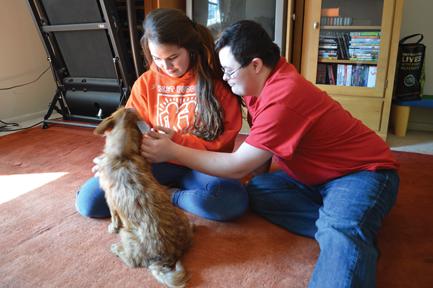According to sophomore Samantha Sharkey, her brother, senior Michael Sharkey, is like any other teenager. He attends basketball games with his friends, sings in choir and loves rap music and Big Time Rush.

However, Michael has Down syndrome, which sets him apart from the typical high school student. A recent Time Magazine article stated that while disabilities have an obvious impact on the afflicted child, they also take a toll on the household in a more subtle way by presenting unique difficulties to siblings.
However, Samantha said the challenges of having a sibling with a disability are, for the most part, similar to those of having a sibling without a disability.
“It’s just like the challenges you would have with any sibling, just arguing over stuff, like fighting over who gets the television at what time and what do you want to watch and stuff like that,” she said. “Those are the only challenges we really face.”
Kelly Sharkey, Michael and Samantha’s mother, said she faced a little more difficulty in having a child with Down syndrome, as the only prior knowledge she’d had about Down syndrome came from a television show in a series called “Life Goes On.”
“Right away, we just got to know as much as we could about Down syndrome. I wouldn’t be in the career field I’m in if it weren’t for him,” she said. “It wasn’t like he was different. He was just our baby. It was never like, ‘Oh, you have Down syndrome, so I’m going to love you differently.’”
Samantha said she has noticed people are increasingly accepting of others with disabilities and many embrace Michael instead of excluding him.
“He understands if people use the r-word, ‘retard’ — I hate saying that word — he understands what that means and doesn’t like it when people say that, but he usually doesn’t encounter stuff like that,” she said.
However, according to Samantha, while acceptance of people with disabilities has been growing, some people still treat Michael and her family differently.

“It’s like people look at (people with) Down syndrome and expect them not to be able to do anything, but Michael is actually capable of doing a lot of things that people don’t expect,” she said. “Growing up, I would see people staring. I grew up with him and his friends, and having people with disabilities in my life has become so normal that I don’t see the disabilities anymore. I don’t view them as different, so I don’t understand how people could view them as different.”
Rachael Klippel, president of Best Buddies and senior, said she agrees with Samantha about the trials of having a sibling with a disability.
“I feel like the relationship between the siblings is just like any other relationship,” she said. “They still get annoyed with each other and fight, but they also enjoy each other and like to do stuff together.
“Aside from, obviously, social challenges because people might look at you a little differently or view your family a little differently, there are just daily challenges and being able to have the patience to work with your sibling and realize that they might need a little more special attention than you get or a little more extra help,” she said.
On the other hand, Klippel said, there are benefits to having a disabled brother or sister.
“I think it broadens people’s horizons and helps them be more accepting and not care as much what people think of them,” she said. “It kind of opens their eyes and makes them more accepting all around.”
Likewise, Samantha said having a brother with a disability has in many ways changed her life for the better.
“I have learned so many lessons from having Michael as a brother. I definitely have learned to be patient, because he moves like a turtle. It’s taught me how to love someone for who they are,” Samantha said. “I don’t really see him as a burden on our family. I’m blessed to have him in my life.”




























![Keep the New Gloves: Fighter Safety Is Non-Negotiable [opinion]](https://hilite.org/wp-content/uploads/2024/12/ufcglovescolumncover-1200x471.png)
















































![Review: “We Live in Time” leaves you wanting more [MUSE]](https://hilite.org/wp-content/uploads/2024/12/IMG_6358.jpg)
![Review: The premise of "Culinary Class Wars" is refreshingly unique and deserving of more attention [MUSE]](https://hilite.org/wp-content/uploads/2024/12/MUSE-class-wars-cover-2.png)
![Introducing: "The Muses Who Stole Christmas," a collection of reviews for you to follow through winter [MUSE]](https://hilite.org/wp-content/uploads/2024/12/winter-muse-4.gif)
![Review: "Meet Me Next Christmas" is a cheesy and predictable watch, but it was worth every minute [MUSE]](https://hilite.org/wp-content/uploads/2024/11/AAAAQVfRG2gwEuLhXTGm3856HuX2MTNs31Ok7fGgIVCoZbyeugVs1F4DZs-DgP0XadTDrnXHlbQo4DerjRXand9H1JKPM06cENmLl2RsINud2DMqIHzpXFS2n4zOkL3dr5m5i0nIVb3Cu3ataT_W2zGeDAJNd_E-1200x884.jpg)
![Review: "Gilmore Girls", the perfect fall show [MUSE]](https://hilite.org/wp-content/uploads/2024/11/gilmore-girls.png)
![Review in Print: Maripaz Villar brings a delightfully unique style to the world of WEBTOON [MUSE]](https://hilite.org/wp-content/uploads/2023/12/maripazcover-1200x960.jpg)
![Review: “The Sword of Kaigen” is a masterpiece [MUSE]](https://hilite.org/wp-content/uploads/2023/11/Screenshot-2023-11-26-201051.png)
![Review: Gateron Oil Kings, great linear switches, okay price [MUSE]](https://hilite.org/wp-content/uploads/2023/11/Screenshot-2023-11-26-200553.png)
![Review: “A Haunting in Venice” is a significant improvement from other Agatha Christie adaptations [MUSE]](https://hilite.org/wp-content/uploads/2023/11/e7ee2938a6d422669771bce6d8088521.jpg)
![Review: A Thanksgiving story from elementary school, still just as interesting [MUSE]](https://hilite.org/wp-content/uploads/2023/11/Screenshot-2023-11-26-195514-987x1200.png)
![Review: "When I Fly Towards You", cute, uplifting youth drama [MUSE]](https://hilite.org/wp-content/uploads/2023/09/When-I-Fly-Towards-You-Chinese-drama.png)
![Postcards from Muse: Hawaii Travel Diary [MUSE]](https://hilite.org/wp-content/uploads/2023/09/My-project-1-1200x1200.jpg)
![Review: "Ladybug & Cat Noir: The Movie," departure from original show [MUSE]](https://hilite.org/wp-content/uploads/2023/09/Ladybug__Cat_Noir_-_The_Movie_poster.jpg)
![Review in Print: "Hidden Love" is the cute, uplifting drama everyone needs [MUSE]](https://hilite.org/wp-content/uploads/2023/09/hiddenlovecover-e1693597208225-1030x1200.png)
![Review in Print: "Heartstopper" is the heartwarming queer romance we all need [MUSE]](https://hilite.org/wp-content/uploads/2023/08/museheartstoppercover-1200x654.png)




